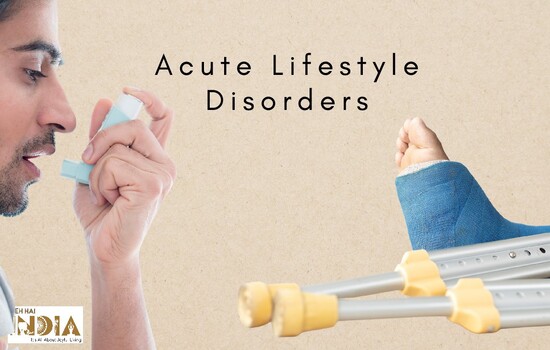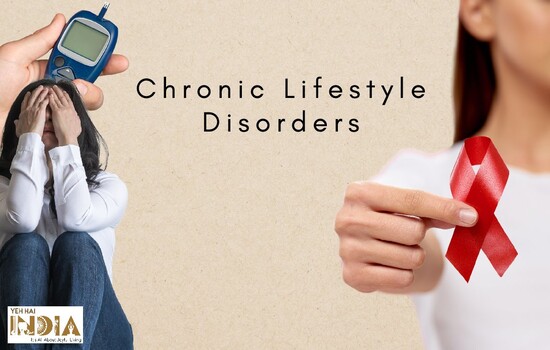In the modern technology driven world, a great number of people are falling victim to lifestyle disorders, more than ever.
In case of any illness, the normal course of action undertaken by a large number of people is consulting a physician and seeking prescriptions.
This method of treating lifestyle disorders fails to bear any fruitful results as the medicines prescribed by doctors work to treat the symptoms alone and not their root cause.
Speaking of the types of Lifestyle disorders, these diseases are classified into two broad categories:
Types Of Lifestyle Disorders:
1. Acute Lifestyle Disorders

Acute lifestyle disorders are diseases that crop up unexpectedly and last for a short duration. These illnesses need immediate attention and get treated promptly with medicines.
Fractures, asthma, respiratory and cardiovascular illnesses are some examples of acute lifestyle disorders.
Recommended Story – Here To Help, Let Us Talk About Mental Health
2. Chronic Lifestyle Disorders

Chronic lifestyle disorders take time to show up. These conditions need specialized attention and long term medication to help manage the symptoms.
Diseases like arthritis, osteoporosis, depression, diabetes, hormonal dysfunction, hypertension, obesity and cancer are some common types of chronic lifestyle disorders.
Both these categories of lifestyle disorders develop due to unhealthy habits, poor mental state and inappropriate diet.
To think of treating these two categories of lifestyle diseases with conventional treatment, without any kind of intervention in the patient’s diet, lifestyle and emotional health, is something next to impossible.
Limitations Of Conventional Treatments:

Being largely ignorant of the root cause of Lifestyle disorders, a great number of people lack the skills to implement lifestyle fixes for treating and preventing such conditions.
So whenever an illness strikes, the only option left with people is to schedule an appointment with a doctor.
The conventional approach adopted to treat lifestyle disorders enlists examining a patient’s health status via blood tests or other procedures like urine tests or body scans recommended by a doctor to detect the presence of a disease.
Prescriptions are made based on the test results.
However, this method of treating diseases offers a temporary fix as the medicines suggested by doctors are formulated to treat only the symptoms arising with a particular health problem.
These medicines do not target the underlying factors that contribute to development of such diseases.
Over time the effect of medicines starts to diminish and the right dosage has to be refigured to bring relief from the troublesome symptoms.
On the flipside, there’s a risk of suffering from fatal effects of long term medicine use and increased dosage.
Consequently, it becomes vital to be familiarized with the key contributing factors of lifestyle diseases and make necessary fixes for permanent relief from health problems.
Treating The Root Cause Of Lifestyle Disorders:

There are a range of factors that account for the development of Lifestyle diseases, the most common one being lack of awareness and education about nutrition, lifestyle patterns and their effects on health.
According to one study, around 60% of diabetics were totally ignorant of the type of foods they should be eating to keep their blood sugar levels under control.
It’s crucial to instill awareness pertaining to the role of a patient’s diet, lifestyle and emotional wellbeing in treatment and prevention of lifestyle diseases.
Since lifestyle disorders are closely linked with diet, lifestyle and emotional health of an individual, a three pronged approach is required to get permanent relief from these disorders. Nutrition, Mental or Spiritual Wellbeing and Physical Activity are the three domains that need attention for prolonged relief from diseases.
1. Nutrition

Keeping in view the existing health status, a diet plan is recommended to implement necessary fixes in the patient’s wrongful eating patterns for reduction in the severity of diseases. For instance, patients with diabetes are put on a diet consisting of complex carbs instead of refined sugars to manage insulin release within the body.
A nutritionist is the best person to seek advice on the type of diet recommended for a specific health condition. A carefully charted out diet plan goes a long way in managing the disease and restoring normal bodily functions. Keeping a daily record of the time, duration, quantity and modes of consumption of different food groups also helps encourage healthy eating habits in patients suffering from chronic diseases. .
2. Spiritual Well Being

For those seeking to get respite from stress and its effects on health, spirituality comes into play to help manage stress and the impact of rising cortisol levels on our body.
People who often face stressful situations are most vulnerable to developing lifestyle diseases.
Practicing meditation, yoga and other spiritual activities is proven to lower the chances of progression of lifestyle diseases to some extent.
Besides, these activities also prepare you to face the struggles life throws at you and be ready for invasive therapies and lengthy treatments.
Spirituality also helps you focus better on your own life and identify the precursors that lead to a particular health condition in your case.
3. Physical Activity

As a measure to step up physical activity in people with limited mobility who have to repeatedly suffer the consequences of an inactive lifestyle, a regular exercising schedule is developed keeping in view the current health status of such people.
Staying active is essential not only to shed extra kilos but also for keeping chronic lifestyle conditions like obesity, hypertension, osteoporosis and diabetes at bay.
Another significant benefit of leading a physically active lifestyle is improved mental health and freedom from depression.
Having a regular exercising schedule keeps the neurotransmitters functioning normally which in turn regulate serotonin and dopamine release in the body, also known as ‘happiness hormones’.
These two brain chemicals influence our thinking patterns and health in infinite ways.
Conclusion:

For complete wellness these three domains need to be paid attention to for prevention of lifestyle disorders.
According to some studies, attempting to treat lifestyle diseases holistically fetched much better results than allopathic treatments. The benefits on health were also observed to be long lasting.
Notwithstanding, one cannot completely rule out allopathic treatments.
Hence the best approach for treatment of lifestyle disorders is to find the root cause and work towards its prevention through a three pronged approach that seeks to cut the risk of diseases and mortality rate in patients to zero.
Also Read – Bhramari Pranayama – Yoga for Mental Detox










